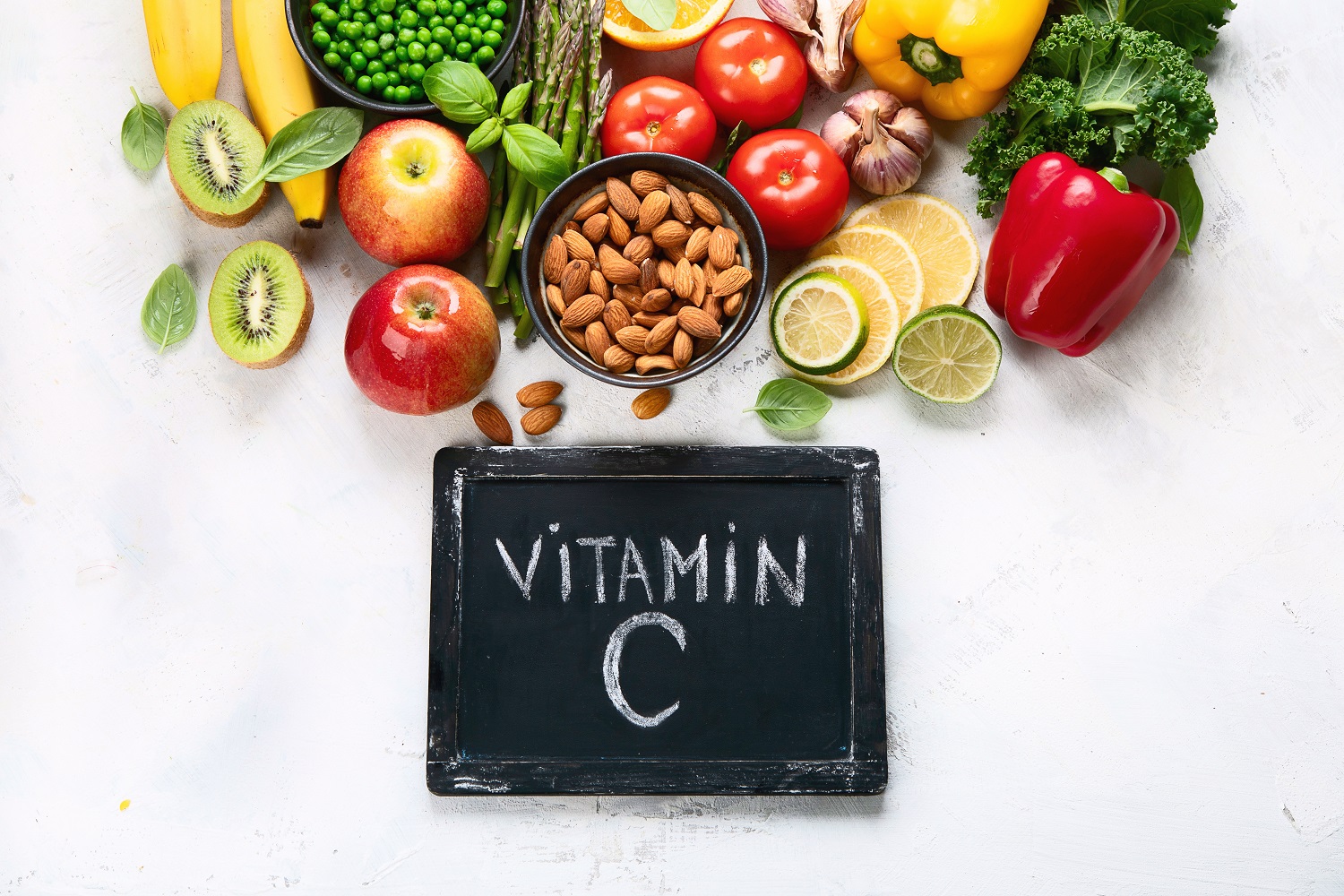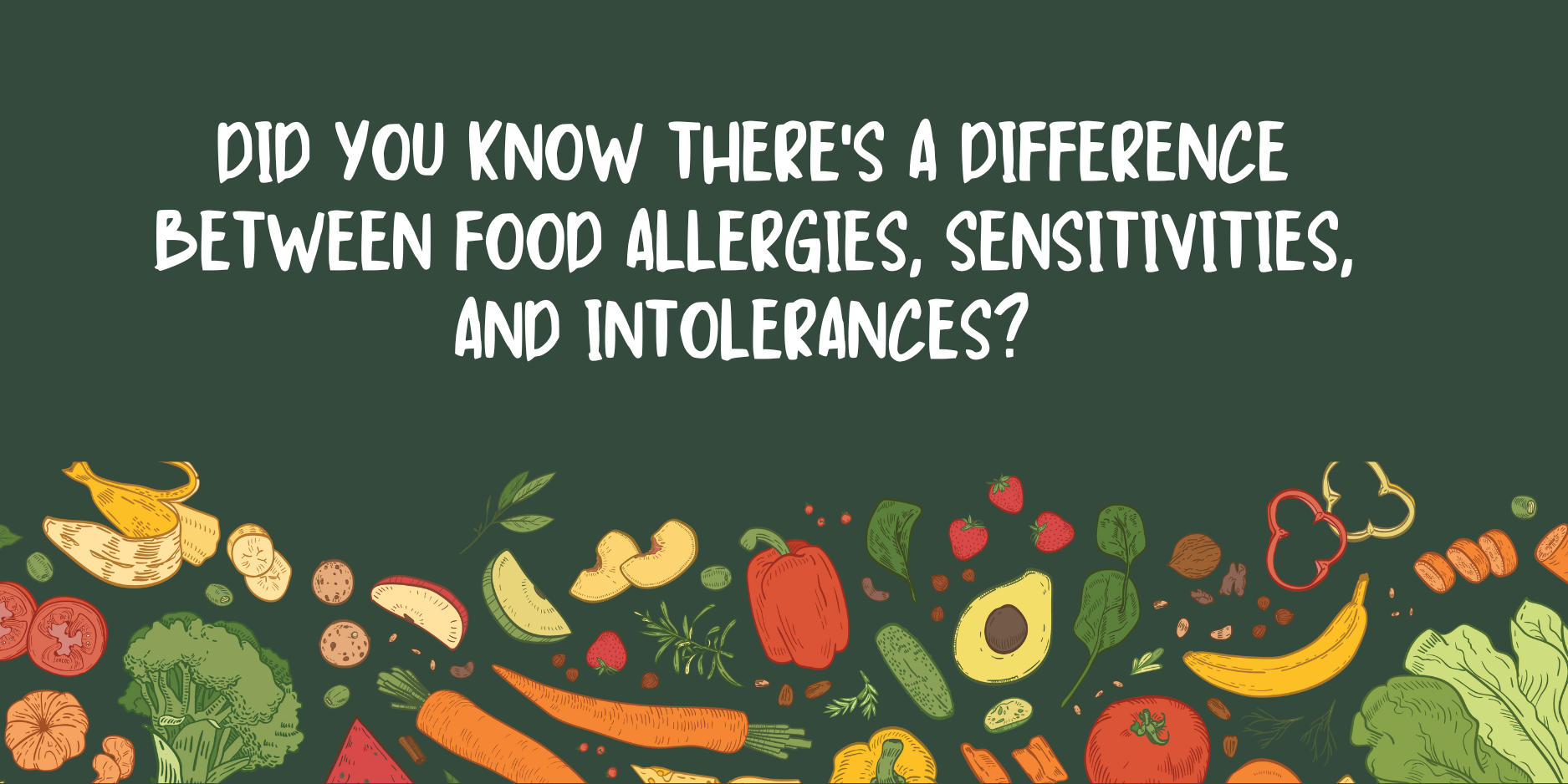

Uh oh.
You just woke up with a tickle in your throat.
The first thing that might cross your mind is to grab a box of vitamin C packets from your local pharmacy. And with cold and flu season here, you’ll be able to find this and other vitamin C supplements stocked in stores now. But does supplementing with vitamin C actually help reduce the severity of your illness, or is it all just a folk tale or marketing ploy to get you to drink more orange juice?
Well, vitamin C can provide support to your immune system – but the way it does may be surprising to you.
Let’s bust vitamin C myths and understand the scientific studies behind:
- What vitamin C is
- What it’s good for
- How to know if you’re deficient in it
- Where to find foods high in vitamin C
What’s the Difference Between Ascorbic Acid and Whole Food Vitamin C Sources?
The chemical terms for vitamin C are L-ascorbic acid and ascorbate. It’s a water-soluble vitamin and antioxidant that you aren’t able to synthesize in your body, so you need to obtain it through whole foods. It’s also vital to body functions that we’ll explore later in this article.
Now, take a look at the back of most vitamin C supplement ingredient lists. You can also Google this too. Most will say, “Vitamin C (as ascorbic acid).” But is this vitamin C the same vitamin C that you would obtain through whole-food vitamin C sources?
Nope, it’s not.
Nature never makes isolated ascorbic acid. Instead, vitamin C comes as a complex that includes ascorbic acid in food sources, like in oranges for example.
So, what’s the deal with ascorbic acid? Ascorbic acid is an isolated component that’s mass-produced. It’s created from the sugar dextrose that comes from a fruit or vegetable source.
However, in nature, vitamins are found in complexes. Therefore, isolated ascorbic acid is synthetic and not found in nature. In nature, ascorbic acid is the outer, protective coating of the vitamin C complex that’s an antioxidant that acts as a preservative.
Inside the vitamin C complex, you’ll find bioflavonoid complexes, P-Factors (rutin) used to enhance collagen, K-factors that have a clotting mechanism, J-Factors that help to oxygenate the blood, and tyrosinase that give your body immune benefits.
When you consume whole foods that contain vitamin C, you’re getting additional nutrients and vitamins as well as the vitamin C complex. If you’re taking synthetic vitamin C, you’ll only be consuming ascorbic acid. This prevents you from getting the added benefits of vitamin C from whole foods.
What is Vitamin C Good For?
Your body needs vitamin C to stay healthy. Below are some selected benefits that vitamin C may bring to your health. This list is by no means comprehensive, as vitamin C’s benefits reach far and wide.
1. Immune system support
Your immune system is your body’s first line of defense when it comes in contact with microorganisms. Vitamin C works in a number of ways to support your immune system.
Vitamin C can:
- Support the epithelial barrier function against pathogens and protects your body from environmental stresses.
- Accumulate in phagocytic cells like neutrophils and increase neutrophil motility. Phagocytic cells are immune cells that act like “pac man cells” by ingesting and destroying cellular debris and microbes.
- Enhance your B cells to increase your body’s antibodies. B cells are a type of lymphocyte ( white blood cell) that’s made in your bone marrow and found in your lymph tissue.
- Enhance your T cells which help you fight pathogens. T cells are the second main type of lymphocytes that kill tumor cells and control immune responses. T cell development also requires vitamin C.
- Increase interferon, a polypeptide hormone that kills infected cells and their infected neighbors
What does all of this mean? It enhances both innate and adaptive immune responses, which is great news!
2. Antiviral Properties
This benefit ties in with immune system support, but is worth mentioning due to vitamin C’s potential treatment and/or prevention supplement regimen for most viruses, including COVID-19. Vitamin C supports lymphocyte activity, increases interferon-α production, reduces inflammation, restores mitochondrial function, and modulates cytokines. It may be used in conjunction with other bioflavonoids that enhance antiviral, antioxidant, immunoprotective, anti-inflammatory effects.
3. Building blocks for collagen
As mentioned above, vitamin C supports epithelial barrier function for your immune system. Vitamin C is essential for collagen biosynthesis as it serves as a cofactor for enzymes responsible for stabilizing and crosslinking collagen molecules. Many of the scurvy symptoms mentioned in the next section are due to impaired collagen synthesis.
Topical vitamin C is also commonly used in the dermatology field due to its probable anti-aging effects by increasing collagen production, decreasing pigmentation, and protecting against oxidative damage.
Your bones are also made up of a framework of collagen, and vitamin C was shown to reduce the risk of hip fractures and osteoporosis. Cell studies showed vitamin C inducing osteoblast and osteoclast formation. Osteoblasts are cells that form new bone, and osteoclasts are cells that degrade bone to initiate new bone formation. Therefore, there seems to be an association between vitamin C and bone density.
In addition to your bones, collagen is also found in your arteries. Your arteries’ collagen layers protect your arteries from rupturing. A study showed that vitamin C was able to improve flow-dependent dilation in patients with chronic heart failure by increasing nitric oxide availability. Flow-dependent dilation is when your arteries widen (dilate) when blood flow increases. It’s an indicator of cardiovascular disease such as atherosclerosis. Someone with atherosclerosis will have impaired flow-dependent dilation which may contribute to a heart attack or stroke.
4. Potential cancer treatments
Demethylation, or the removal of a methyl group (-CH3) from a molecular structure, is dependent on vitamin C, among other key nutrients. Your body’s ability to cycle through methylation and demethylation determines how your genes respond to your environment – this process is called epigenetics.
How does this tie in with cancer?
Well, cancer cells shift their balance towards methylation and show low levels of demethylation. This poor demethylation is demonstrated by low levels of 5-hydroxy-methyl-cytosine (5hmC), a molecule that’s the first step in demethylation sequence and is an epigenetic marker for cancer. Mutations in demethylation enzymes may result in hypermethylation in cancer cells. And since vitamin C is a helper of these demethylation enzymes, low levels of vitamin C may contribute to hypermethylation found in cancer cells.
A study in breast cancer patients showed that high vitamin C intake correlated with lower mortality. Vitamin C may be used in conjugation with other anticancer therapies. For example, a low dose of methotrexate (an anticancer drug for tumors) and vitamin C were combined and induced cell death in hepatocellular carcinoma cells (liver cancer). While these studies show the potential for vitamin C to be used in cancer treatments, more studies need to be conducted.
5. Cataract prevention
A cataract occurs when your eye’s natural lens becomes cloudy due to proteins breaking down. The major risk factors are aging and diabetes. Cataracts will cause your vision to appear hazy and less colorful. It can eventually lead to blindness.
A study was conducted in a Mediterranean population and found that vitamin C played a protective role on the aging lens. Similar studies showed the same results in other world populations – high levels of vitamin C supplementation reduced the risk of cataracts. Vitamin C’s antioxidant effects and its ability to absorb ultraviolet light may contribute to its cataract-preventing properties.
As you can see, vitamin C has many health benefits. This list just reflects a portion of its advantages. Problems may arise if you are vitamin C deficient. Below is a list of symptoms you may experience if you aren’t consuming enough vitamin C.
Signs and Symptoms of Vitamin C Deficiency
Vitamin C’s discovery started with a disease called scurvy, a disease caused by prolonged vitamin C deficiency. Symptoms include fatigue, skin bruises, bleeding gums, anemia, and loose teeth. If scurvy is left untreated, it may result in death. It was a prominent disease in sailors in the 1700s as most sailors would eat food that can be preserved for a long time in a boat – mainly meat and grains.
In 1757, Dr. James Lind discovered that citrus fruits could prevent scurvy, and it was necessary for all British navy sailors to consume oranges and lemons. It wasn’t until 1928 that medicinal chemist Albert Szent-Gyӧryi isolated hexuronic acid from adrenal glands. After Charles Glen King isolated vitamin C in his laboratory in 1761, it was concluded that this vitamin C was the same hexuronic acid that Szent-Gyӧryi isolated.
While it may seem that vitamin C deficiency is a thing of the past, it can still be diagnosed. It’s linked mainly to malnutrition. Those who have an increased risk of vitamin C deficiency include heavy drinkers, those with gastrointestinal disorders such as inflammatory bowel disease, smokers, and Type I diabetics. Below is a list of signs and symptoms of vitamin C:
- Hair and nail abnormalities
- Painful, swollen joints
- Slow wound healing
- Bleeding gums
- Nosebleeds
- Weight gain
- Bruises
- Irritability
Scurvy symptoms develop a few months after deficiency. Defects in connective tissue may occur. You are also susceptible to fatal infections like pneumonia because your body’s immune system capacity is decreased. Symptoms of scurvy include:
- Swollen, purple, spongy, and/or bleeding gums
- Spontaneous hemorrhages
- Follicular hyperkeratosis
- Teeth loss
- Coiled hair
Vitamin C deficiency in newborns and infants can manifest in the following symptoms:
- Slowed growth
- Bleeding
- Irritability
- Anemia
While the symptoms above may be a signal that you’re deficient in vitamin C, a doctor’s visit and laboratory tests need to be conducted to determine a proper diagnosis. A doctor may diagnose vitamin C deficiency through skin or gingival exam and/or a complete blood count. For children, an x-ray may need to be conducted to diagnose scurvy. True scurvy is rare in developed countries.
Eight Whole Foods with High Vitamin C Levels
The best treatment for vitamin C deficiency is through diet. Your doctor may recommend that you work with a dietician or health coach and may recommend supplementing with vitamin C. You may be able to stop supplementation after a while, but it’s important that you work with your doctor to determine dosage and when you can stop supplementation.
Now when it comes to diet, oranges may be the first fruit that comes to your mind when you think of vitamin C. But did you know there are whole foods with higher levels of vitamin C than oranges? Here’s a list of fruits and vegetables with vitamin C.
1. Kale
A leafy green vegetable with a high amount of vitamins and micronutrients, kale is a vegetable that contains more than 40% of the recommended daily intake (RDI) of vitamin C. While additional studies need to be completed, kale that’s grown organically may contain a higher amount of vitamin C than those grown conventionally.
2. Peppers
Peppers also contain a significant amount of vitamin C. These peppers range from bell peppers to chili peppers. For example, there are 240 mg of vitamin C in100g of fresh red chili pepper. This is five times more vitamin C than that found in an orange. Keep in mind that the levels of vitamin C diminish in your peppers when cooked since vitamin C is sensitive to drying and heat.
While cooked and dried peppers will have varying levels of vitamin C, the type and maturity level of pepper also matters. For example, a study was conducted comparing green (immature), yellow (half mature), orange (half mature), and red (mature) bell peppers to see which contained the highest amount of vitamin C. The highest vitamin C levels were found in yellow bell peppers and the lowest in green bell peppers. So, it appears that different colors and different maturity levels have varying vitamin C contents.
3. Broccoli
In addition to kale, broccoli is a cruciferous vegetable with a high amount of vitamin C. IT also contains high levels of antioxidants and anticarcinogenic compounds. It also reduces the risk of chronic diseases like cardiovascular disease.
While stir-frying and boiling broccoli causes a great loss of vitamin C. This may be due to vitamin C being water-soluble and leaching into the water-filled cooking environment. To ensure the least amount of vitamin C is lost from cooking broccoli, consider steaming the vegetable.
4. Brussels sprouts
Also in the family of cruciferous vegetables, one-half cup of steamed Brussels sprouts contains 54% of the daily value of vitamin C. They also contain cancer preventative qualities likely due to their ability to inhibit oxidative DNA damage.
5. Cauliflower
There’s been a cauliflower craze in the health industry— you’ll find cauliflower pizza, cauliflower fried rice, snacks, and tortillas lining your grocery aisles. While the nutritional value of these foods will be different, one cup of cooked cauliflower contains almost 100% of the recommended daily amount of vitamin C.
The nutritional value of vitamin C will vary based on the cauliflower’s processability and method of cooking. While it’s mainly white in color, cauliflower is also found in shades of purple, green, and orange.
6. Citrus fruits
Citrus fruits may be the first foods you think about when it comes to vitamin C thanks to marketing. Well, whole citrus fruits do contain a great amount of vitamin C. These include lemons, limes, grapefruits, oranges, and pomelos.
Citrus fruits were used to prevent and treat scurvy as early as 1564. Now, the amount of vitamin C in citrus depends on a number of factors including production factors, climate conditions, fruit maturity, processing techniques, handling, and storage. Storage temperature seems to play a large role in the loss of vitamin C. For example, when vitamin C is canned, the storage temperature needs to be carefully chosen because high temperatures can result in considerable loss of vitamin C. Oxygen is also a main factor of vitamin C losses.
7. Kiwi
Kiwi fruit has one of the highest sources of vitamin C. One kiwi fruit contains more vitamin C than oranges, and one serving of kiwifruit delivers the recommended dietary intake of vitamin C. In fact, out of a study done including exotic fruits such as pineapple, kiwi, and pomegranate, kiwi had the highest content of vitamin C. Pineapple had the second-largest amount.
8. Acerola cherries
Acerola cherries thrive in tropical and subtropical America, especially in the Caribbean Islands. The juice from acerola cherries is known in the scientific literature to provide the richest edible food source of vitamin C, about 50-100 times more than that of orange juice. A study found that ascorbic acid from whole foods like acerola cherries was absorbed by the body more efficiently than synthetic vitamin C.
These whole foods can be added to your diet to ensure that you’re consuming the recommended daily amount of vitamin C! Here are a couple of benefits of consuming whole foods compared to synthetic ascorbic acid.
Whole foods that contain vitamin C are also rich in other micronutrients, phytochemicals, and dietary fiber that may influence vitamin C’s bioavailability. In addition, you may also find vitamin C in certain herbal teas, like those containing hibiscus, rose hips, dried citrus, and berries. Herbal tea is a personal favorite of mine–I have some every single day!
As stated in a previous section, vitamins in nature are found in complexes. Isolated ascorbic acid found in many supplements is synthetically made. Now, there are vitamin C supplements that contain multiple ingredients compared to just ascorbic acid.
My Super C supplement contains bioflavonoids that more closely resemble the vitamin C found in nature. This will ensure that you’re receiving the benefits that the vitamin C complex provides including healthy collagen synthesis and connective tissue, immune function, and normal levels of inflammation. The added ingredients in our supplement include acerola extract, quercetin, hesperidin, hibiscus, and rutin.
Importance of Vitamin C in Our Everyday Lives
While vitamin C is commonly associated with your immune system, hopefully, this blog post was able to demonstrate some of its other health benefits. Also, it’s important to remember that not all vitamin C supplements are the same. For example, some vitamin C supplements may only contain vitamin C as synthetic ascorbic acid. While ascorbic acid is important, there’s no replacement for consuming vitamin C through whole foods such as acerola cherries and kale.
When you eat whole foods, you’ll consume the whole vitamin C complex and not just ascorbic acid. For a supplement that mimics the vitamin C complex found in whole foods, consider taking our Super C supplement.
If you’re experiencing symptoms of vitamin C deficiency or have any other vitamin C questions, feel free to contact our clinic, Arizona Wellness Medicine to get a functional medicine work up, including a nutrient deficiency panel.
Here’s to your health,
Dr. Emily Parke
Share:
Dr. Emily Parke
Social Media
Most Popular Posts
Subscribe To Our Newsletter
Related Posts

New Podcast Episode: My journey into functional medicine + what I’ve learned
I’m excited to share that I recently joined DeLo for Episode 165 of the On the DeLo podcast! In this conversation, we explored my journey

Understanding the Essential Labs for Women on Hormone Replacement Therapy (HRT)
So what are the minimum labs we’re looking at when we do hormone replacement therapy? We obviously want to look at an estrogen level, so

How to figure out the right amount of HRT in women
What about checking lab values when you’re on hormone replacement therapy? I do find it to be helpful, but we also want to consider symptoms.

Did you know there’s a difference between food allergies, sensitivities, and intolerances?
Did you know that there’s a difference between food allergies, food sensitivities and food intolerances? Food allergies, the reactions tend to happen pretty immediately and
